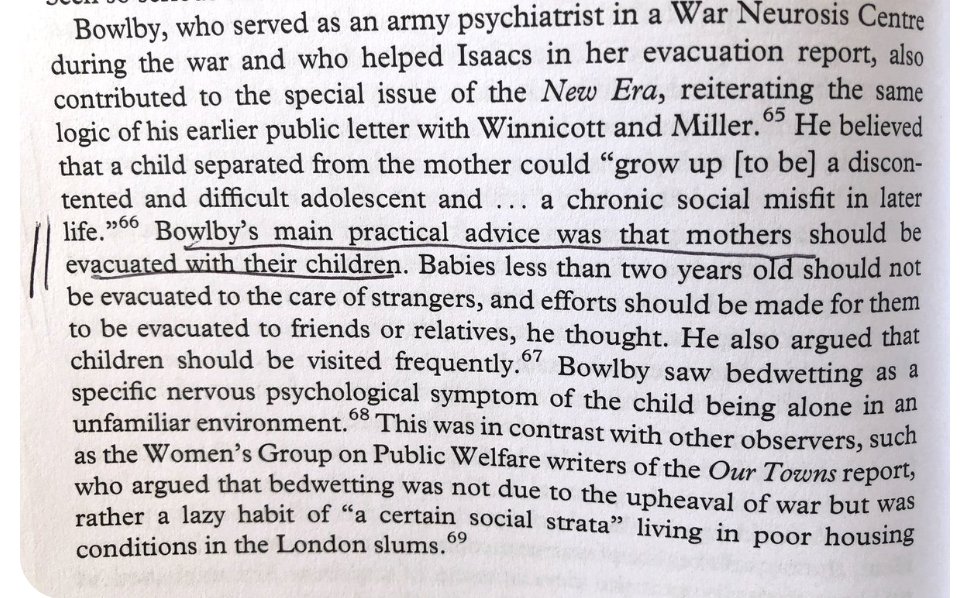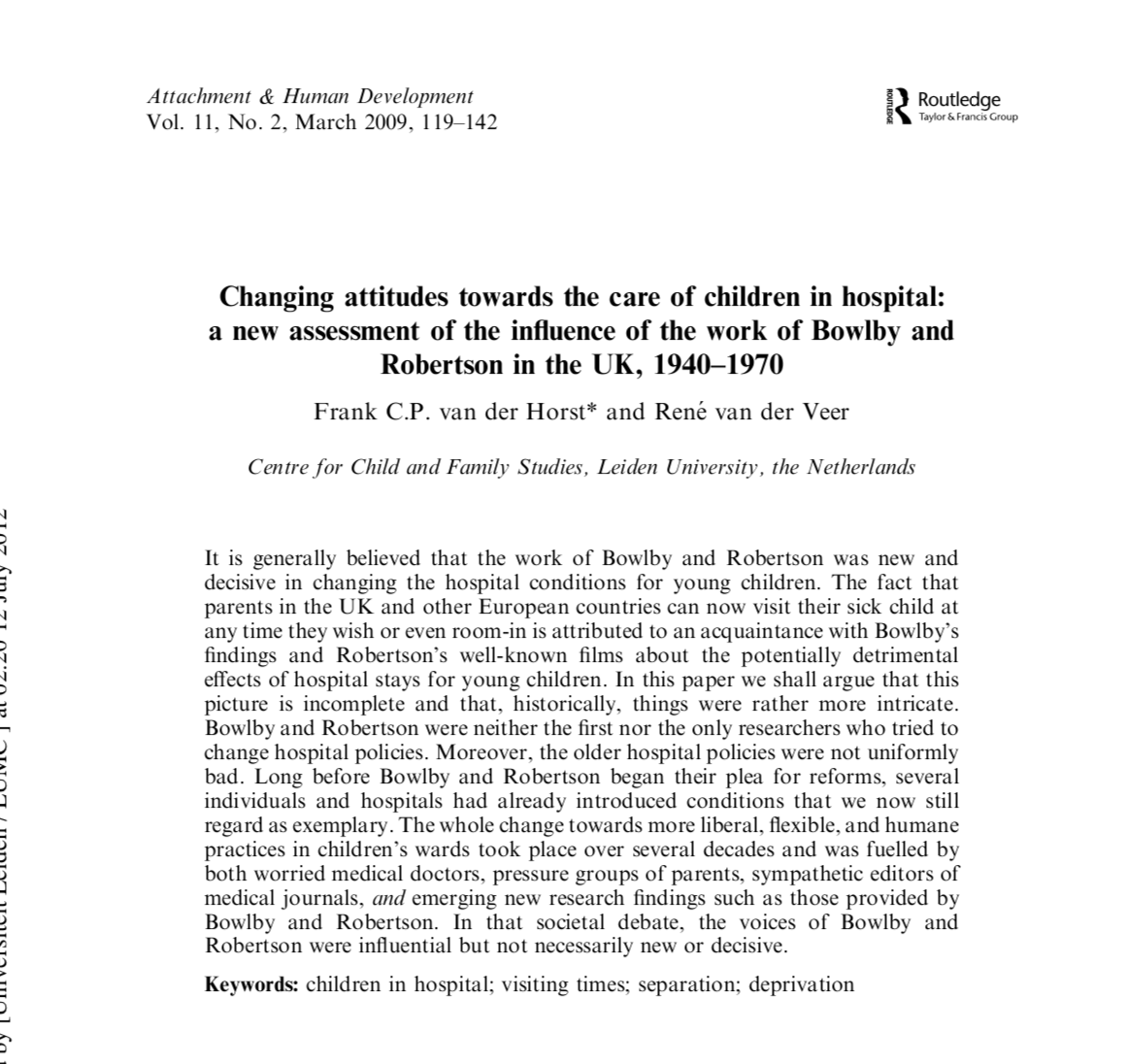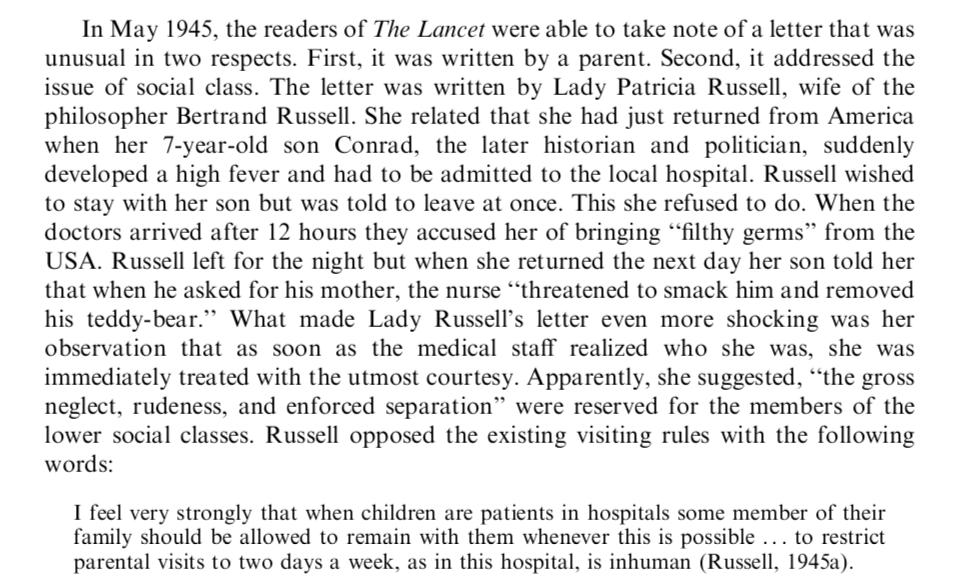A THREAD weaving together coronavirus, crowded parks, class & attachment theory:
Whn t Queen spoke in her message last night abt evacuation of children in WWII, I reached for one of my favourite books on t history of attachmnt theory. AttTheory was born out of evacuation policy
Whn t Queen spoke in her message last night abt evacuation of children in WWII, I reached for one of my favourite books on t history of attachmnt theory. AttTheory was born out of evacuation policy
2. AttTheorists in WW2 were trying to understand how best to guard children& #39;s mental health and what the best evacuation policies should be. They thought, for the youngest children especially, they should not endure lengthy separations frm parents. That caused deep anxiety.
3. Of particular interest to me right now is the last sentence in this passage: the one that smacks of class, snobbery, inequality & misunderstanding: "Others argued children& #39;s bedwetting was not due to anxiety, but was a lazy habit of & #39;a certain social strata& #39; living in slums."
4. I then reached for a 2009 article I keep handy, also reflecting on the history of AttTheory. It explores children& #39;s anxiety in relation to visiting regulations in 1950s hospitals, which many of you will have heard me talk about in presentations.
5. That paper contains t fascinating story told by Lady Russell, whose 7yr-old son was admitted to hospital. She wanted to stay w/ him, which brought accusation&insistence. Once alone, her crying son irritated t overworked staff & he was not allowed to keep his teddy bear.
6. What interests me most are the final sentences of that passage. "As soon as the staff realised & #39;who she was& #39;, Lady Russell was & #39;treated w/ utmost courtesy& #39;. She suggested the neglect & rudeness were reserved for members of the & #39;lower social classes& #39;."
7. An increasing number of discussns are turning to WWII as a way of making sense of the enormity of what we are facing w/ coronavirus: uncertainty, anxiety, separation from loved ones, fear of never seeing those loved ones again. All of that is based in human attachment needs.
8. What these retrospective pieces highlight are how class & inequality & poverty often went unseen & unacknowledged at the time. Suffering & adversity was often viewed thru a lens of judgement & shame, whethr conscious or unconscious. In 2020, the language feels shocking.
9. But my point in ths thread is that t language didn& #39;t seem shocking in 1940s. It can be hard to see privilege in one& #39;s own life&time, especially w/o calling on curiosity&compassn. I found myself thinkng abt all this as I& #39;ve listened to debate on corona lockdown &outdoor space.
10. This weekend, threats that all outdoor time may be restricted hv risen because of failure to observe lockdown rules. So hv reports of domestic violence & pleas frm those living in cramped accommodation for t necessity of outdoor time for mental health. https://www.bbc.co.uk/news/uk-52157620">https://www.bbc.co.uk/news/uk-5...
11. We& #39;ve also witnessed t chaos & anger ensuing from Scotland& #39;s CMO& #39;s actions of visiting her second home and of others who have been asked not to visit second homes or travel to beauty spots. To state the obvious, this row is about class. https://www.theguardian.com/uk-news/2020/apr/05/scotland-chief-medical-officer-seen-flouting-lockdown-advice-catherine-calderwood">https://www.theguardian.com/uk-news/2...
12. So my point in this thread is to take the risk of encouraging greater self-reflection as we figure out how to create coronavirus policy that will decrease t spread of this virus. Failure to pay attention to class&adversity in the 1940s harmed many children for the long-term.

 Read on Twitter
Read on Twitter







